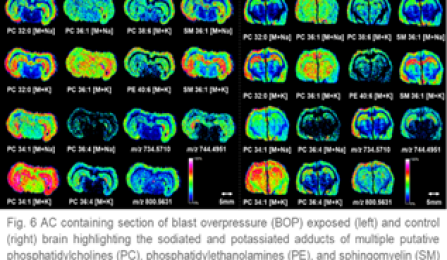Mapping of Metabolic Profiles with the Structural Connectivity of the Auditory Pathway in Blast Traumatic Brain Injury

Images of brain scans highlighting levels of sodium and potassium.
Mapping of Metabolic Profiles with the Structural Connectivity of the Auditory Pathway in Blast Traumatic Brain Injury
Lead Principal Investigator: Vijaya Prakash K. Muthaiah, PT, PhD, Ferdinand Schweser, PhD, department of neurology, and Sara Muldoon, PhD, department of mathematics
Funding Agency: NIH National Center for Advancing Translational Sciences (NCATS) and UB's CTSI Center for Biomedical Imaging
Awarded: June 2022
Abstract: The brain metabolites (Cho, Cr, Glux) are the markers of neuronal integrity, membrane turnover, and cellular energy. As metabolic dysfunction is a signature of traumatic brain injury, TBI, interrogation of metabolites sets a stage for stratification of TBI severity. Robust optimization of these metabolite ratios unravels potential biomarkers for prognosis, provide insights on pathomechanism underlying the associated neurological sequelae and assess the treatment effect of potential drug candidates. Importantly, as blast TBI patients often manifest tinnitus, this study objective also complements the pathomechanism of tinnitus as evidence indicates that tinnitus percept in veterans is due to central gain following imbalance in the excitatory-inhibitory network.
The overall objective of this pilot study is the methodological development of MRS analysis of metabolite profiles at the higher auditory centers in an experimental model of blast injury using Wistar rats. This will be accomplished in the auditory pathway involving the cochlear nucleus, inferior colliculus, and auditory cortex as our regions of interest (ROIs). The specific objective of the study is to examine the susceptibility of metabolite homeostasis ((ratios of GABA/Glutamate, Choline/Creatine (Cho/Cr), N-acetyl-aspartate (NAA/Cr), and phosphocreatine (Pcr/Cr) using a linear combination model of MRS spectrum analysis in ROIs following blast traumatic brain injury (TBI) in Wistar rats. The disruption of the metabolic homeostasis will be mapped with structural connectivity using whole volume diffusion tensor imaging (DTI).

